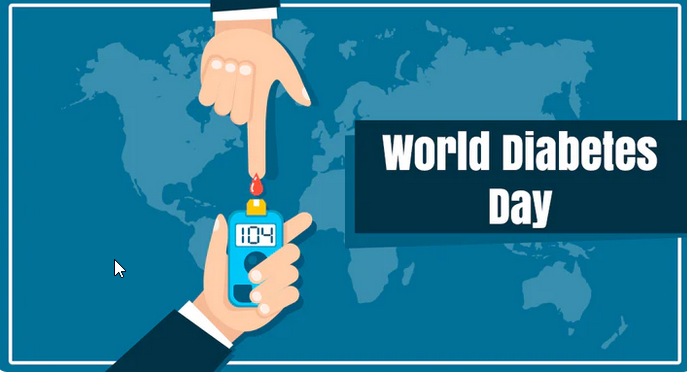World Diabetes Day is not just a day on the calendar- it's a call to action, especially in a country like India where the silent epidemic of diabetes is looming large. According to the World Health Organization (WHO), a staggering 77 million individuals aged 18 and above in India are struggling with type 2 diabetes. But that's not all – another 25 million are on the verge of prediabetes, wavering on the edge of a condition that could change their lives.
What's truly alarming is that more than half of this population remains unaware of their diabetic status. It's like a ticking time bomb, silently counting down to potential health complications that could arise if left undetected and untreated.
The Diabetes Landscape in India: India is often termed the "diabetes capital," with an alarming number of people affected. Sedentary lifestyles, genetic predisposition, and dietary habits contribute to the diabetes surge. Understanding the gravity of the situation is the first step towards effective management.
What is Diabetes: Diabetes is a chronic medical condition that occurs when the body cannot properly regulate blood sugar (glucose) levels. Glucose is a crucial energy source for the body's cells, and its levels need to be carefully controlled. This regulation is primarily managed by insulin, a hormone produced by the pancreas.
In diabetes, there are two main types:
1. Type 1 Diabetes:
- Typically diagnosed in children and young adults.
- The immune system attacks and destroys the insulin-producing beta cells in the pancreas.
- Requires lifelong insulin replacement through injections or an insulin pump.
2. Type 2 Diabetes:
- Often diagnosed in adults, but can also affect children.
- The body doesn't effectively use insulin, and the pancreas may not produce enough.
- Linked to lifestyle factors like poor diet, lack of physical activity, and genetics.
- Managed with lifestyle changes, oral medications, and sometimes insulin.
Common symptoms of diabetes include increased thirst, frequent urination, unexplained weight loss, fatigue, and blurred vision. If left untreated or unmanaged, diabetes can lead to serious complications such as heart disease, stroke, kidney damage, nerve damage, and vision problems.
How to Prevent Diabetes:
1. Healthy Eating Habits:
- Consume a well-balanced diet rich in fruits, vegetables, whole grains, and lean proteins.
- Limit the intake of sugary and processed foods, including sweets and sugary beverages.
2. Regular Physical Activity:
- Engage in regular exercise such as brisk walking, cycling, or other forms of aerobic activity.
- Aim for at least 150 minutes of moderate-intensity exercise per week.
3. Maintain Healthy Weight:
- Achieve and maintain a healthy weight through a combination of a balanced diet and regular exercise.
- Consult with healthcare professionals to determine a healthy weight range.
4. Regular Health Check-ups:
- Undergo regular health check-ups to monitor blood sugar levels and identify any signs of prediabetes or diabetes.
- Early detection allows for timely intervention and management.
5. Limit Alcohol Consumption:
- If you consume alcohol, do so in moderation. Excessive alcohol intake can contribute to diabetes risk.
6. Manage Stress:
- Practice stress-management techniques such as meditation, yoga, or deep breathing exercises.
- Chronic stress can contribute to unhealthy lifestyle choices that may increase diabetes risk.
This World Diabetes Day, let's unmask the silent threat, not just for ourselves but for everyone around us. It's time to turn awareness into action, numbers into stories, and silence into a resounding call for a healthier India. Because when it comes to diabetes, together, we can make a difference.

 According to the World Health Organization (WHO), a significant 77 million individuals aged 18 and above in India are struggling with type 2 diabetes. Additionally, an extra 25 million hover on the brink of prediabetes.
According to the World Health Organization (WHO), a significant 77 million individuals aged 18 and above in India are struggling with type 2 diabetes. Additionally, an extra 25 million hover on the brink of prediabetes.










.jpeg)

.jpeg)
.jpeg)
.jpeg)

.jpeg)
.jpeg)
.jpeg)
_(1).jpeg)

_(1)_(1)_(1).jpeg)
.jpeg)
.jpeg)
.jpeg)






